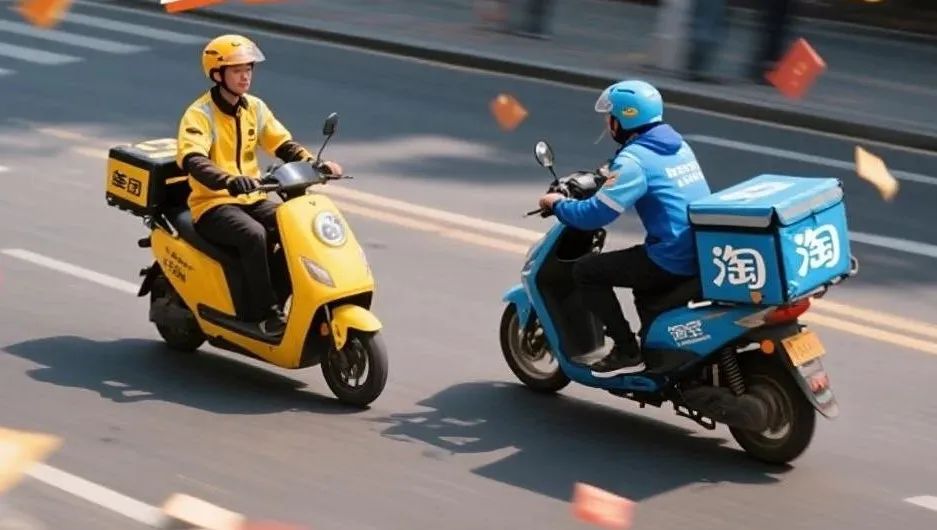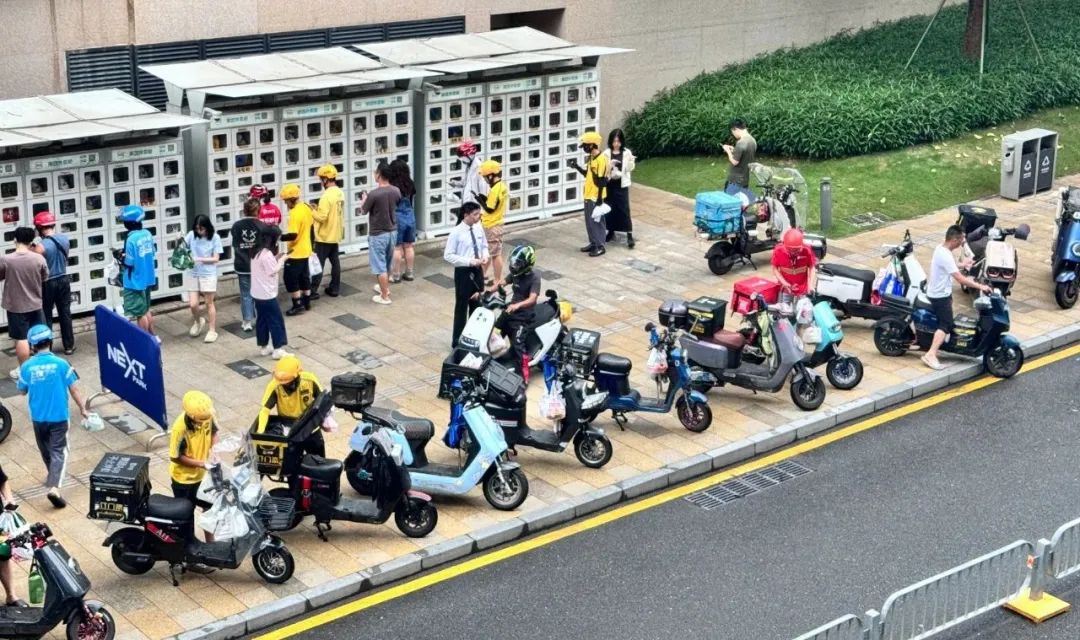Taobao Flash Sale Ramps Up Aggression, Pressuring Meituan
![]() 08/14 2025
08/14 2025
![]() 594
594

As Taobao Flash Sale intensifies its offensive, the pressure on Meituan continues to mount.
Produced by | NewProductSlightly Finance | Author | Wu Wenwu
In the 2025 "First Autumn Milk Tea" delivery battle, Taobao Flash Sale surpassed Meituan in peak order volume last weekend. Increasing evidence suggests that Taobao Flash Sale's aggressive tactics have taken a toll on Meituan.
01 Taobao Flash Sale Intensifies Pressure on Meituan
The latest round of the food delivery war flared up unexpectedly on August 7, the first day of autumn.
Popular tea and milk tea brands traditionally launch "First Autumn Milk Tea" themed marketing campaigns at the start of autumn. Coupled with the ongoing food delivery war, widespread coupon offers, and subsidies, the 2025 "First Autumn Milk Tea" battle was more intense than ever.
On the first day of autumn, "NewProductSlightly Finance" observed food delivery riders near my local mall rushing around with arms full of milk tea and other beverages. One rider complained in the elevator, "I'm so exhausted today; I don't even want to take orders from XX mall."
With such a large promotional push, many consumers couldn't resist the temptation, jumping on the bandwagon, placing delivery orders, and indulging in the first autumn milk tea.
After the "First Autumn Milk Tea" delivery battle concluded, media outlets exposed data from relevant platforms.
According to an August 11 report by LatePost, Taobao Flash Sale surpassed Meituan in peak order volume last weekend, quickly grabbing market attention and sparking heated discussions.
The report stated that on August 7, Taobao Flash Sale set a new daily order volume record at 8 PM. However, for the entire day, Meituan still had approximately 20 million more orders than Taobao Flash Sale.

From August 7 to 9, fueled by promotions for "First Autumn Milk Tea," "88 Member Day," "Super Saturday," and pervasive advertising, Taobao Flash Sale exceeded 100 million daily orders for three consecutive days. On August 8 and 9, Taobao Flash Sale's daily order volume share surpassed Meituan for the first time.
However, Taobao and Meituan use different metrics for daily order volume. Meituan's metric includes orders completed and fulfilled, i.e., orders delivered to consumers on the same day. Taobao's metric includes orders completed and transacted, i.e., orders paid for by consumers on the same day, including pre-ordered second-day deliveries. Data shows that on August 7, Taobao Flash Sale's pre-orders accounted for nearly 10%.
Taobao Flash Sale's latest offensive in the food delivery war is another demonstration of its strength, particularly last weekend when it surpassed Meituan in peak order volume, showcasing the impact of its aggressive tactics.
While Meituan still dominates the food delivery market, facing Taobao Flash Sale's intense pressure, its momentum has not waned. Coupled with recent data from the "First Autumn Milk Tea" battle and mounting evidence that Taobao Flash Sale's aggressive tactics have hurt Meituan.
02 Intensifying Pressure on Meituan
In previous food delivery wars a few years ago, Meituan emerged as the biggest winner, firmly securing the top spot in the market. Although Ele.me still exists, it has struggled to threaten Meituan's position, which has since grown stronger, easily dominating the food delivery market.
A couple of years ago, Douyin also attempted to enter the food delivery market but focused more on in-store business, failing to make significant waves, and Meituan remained the top player.
Unexpectedly, in February 2025, JD.com made a high-profile entry into the food delivery market, emphasizing quality deliveries, subsidizing merchants, providing social security for riders, and playing the emotional card. They achieved impressive results and garnered substantial attention. In response to JD.com's competition, Meituan's Wang Xing later vowed to do whatever it takes to win.
However, at the end of April, Ele.me intensified its efforts in the food delivery market, with Taobao upgrading its flash sale business behind the scenes. The food delivery war and the underlying instant retail war escalated. Initially, Meituan responded calmly, but by the end of June, Taobao Flash Sale announced a 100-day growth plan, increased subsidy amounts, and went all in, mobilizing all its business resources. At that point, Meituan quickly felt a sense of crisis. Facing Taobao Flash Sale's intense pressure, Meituan Flash Sale also rarely made a general mobilization.

As July and August progressed, Taobao Flash Sale continued to ramp up its efforts. Alibaba also mobilized significant resources from its ecosystem for the Taobao Flash Sale business, integrating business resources such as Ele.me, Fliggy, and Hema. Naturally, Meituan felt increasing pressure from Taobao Flash Sale.
In the latest "First Autumn Milk Tea" marketing battle, last weekend, Taobao Flash Sale surpassed Meituan in peak order volume. Although it's a short-term data competition, at least during that period, Meituan faced considerable pressure and undoubtedly felt the pain inflicted by Taobao Flash Sale's offensive.
According to media reports, after spending 25 billion yuan on the food delivery war, Wang Puzhong, the operator of Meituan's core business, granted an interview for the first time and directly called on Jiang Fan to "cease fire," stating that this kind of "competition" was meaningless and that all that remained were bubbles.
Alibaba is striving to regain e-commerce market share lost in previous years. After Jiang Fan, the Alibaba warrior, returned to the center of power, he is also betting big on flash sales. The strategic importance of Taobao Flash Sale to Alibaba extends beyond the food delivery market; it's also about finding incremental business in instant flash sales.
The food delivery war and instant retail war between Taobao Flash Sale and Meituan are fierce, with no signs of abating. Some media commentators even said, "Jiang Fan recreates a 'Meituan'?"
Facing Taobao Flash Sale's intense pressure, Meituan must accept the challenge and respond accordingly. Meituan refuses to be outdone. Besides using strategies to suppress Taobao Flash Sale in terms of order volume, Meituan has also started implementing more countermeasures.
For example, at the end of July, Meituan adjusted its strategy, shifting focus from ensuring order volume to retaining its Black Gold and Black Diamond level members, referring to high-value users who spend over 10,000 yuan and 30,000 yuan annually on Meituan, respectively. The aim, of course, is to defend its core base.
After all, this food delivery war will eventually come to an end. With subsidies dwindling and consumer enthusiasm decreasing, natural order volume will decline. Ultimately, it will be a marathon, not a short-term sprint.
LatePost quoted the view of a person close to Meituan, reporting that Taobao Flash Sale is charging ahead with no intention of stopping. E-commerce profits are substantial enough to provide the confidence to spend lavishly. However, many Meituan employees expressed long-term patience for competition but also mixed with some dissatisfaction.
03 When Will the Food Delivery War End?
As this round of the food delivery war continues, diverse viewpoints from various sectors emerge, with distinct contrasting perspectives.
On one hand, this round of the food delivery war has definite winners, and these winners surely hope the war can continue longer.
The primary winners of this food delivery war are naturally the three major internet giants: Meituan, JD.com, and Alibaba. Although they have spent tens of billions or even hundreds of billions of yuan in subsidies, each has its own objectives.
Another significant winner of the food delivery war is the leading coffee giant, Luckin Coffee. Its financial report shows that Luckin Coffee's second-quarter revenue reached 12.36 billion yuan, exceeding Bloomberg consensus expectations by nearly 1.3 billion yuan. Its profitability is also impressive, with operating profit soaring to 1.7 billion yuan, both setting new record highs. A key factor in Luckin Coffee's bright financial report is the food delivery war. It can even be said that Luckin Coffee is the biggest beneficiary of the food delivery war. Kudy and even Starbucks have also seen an increase in food delivery orders.
On the other hand, where there are winners, there are naturally affected parties. Now, many voices express that the food delivery war has become unbearable.
While the food delivery war has enriched Luckin Coffee, small and medium-sized cafe owners are worried. Not long ago, "NewProductSlightly Finance" chatted with the owner of a cafe near my home, who responded that the food delivery war had suddenly reduced cafe business.
The food delivery war allows consumers to take advantage of promotions, but someone has to foot the bill. Many small and medium-sized catering enterprises and restaurants find themselves in a dilemma. Food delivery is not very profitable anyway, and they take orders if they can earn a bit more. However, food delivery subsidies are paid by the platform and merchants, increasing costs for small and medium-sized catering establishments already struggling with thin profits. Even Xi'bei's Jia Guolong called on food delivery platforms to return pricing power to merchants last month.

Internet business wars are always intense, but sooner or later, there must be a truce and ceasefire. So, when will this round of the 2025 food delivery war end?
In the view of "NewProductSlightly Finance," the end of this round of the food delivery war seems largely in the hands of the three internet giants but will also be influenced by other factors.
First, the amount of subsidies the three internet giants can provide and how long they can sustain it is crucial to when the food delivery war will end.
In the second quarter of 2025 alone, Meituan, Alibaba, and JD.com burned 25 billion yuan in the food delivery battlefield, with Alibaba's estimated annual subsidy as high as 41 billion yuan. As long as the food delivery war continues, continuous investment is required.
While the three major internet giants all have substantial financial reserves, huge subsidies cannot last forever. Even international investment bank UBS has expressed the view that this is a "game of chicken" in capital slaughter.
Second, the three major internet giants each have their own intentions, and their vision and ambitions extend beyond just the food delivery business.
After entering the food delivery market, JD.com quickly achieved impressive results. JD.com's entry into food delivery was not a whim but a long-term strategy. Having achieved its phased goals, JD.com then ventured into the cultural tourism sector. Besides defending and increasing order volume in the food delivery market, Taobao Flash Sale's bigger goal is flash sales, telling a new story. Meituan, of course, aims to defend its market share in food delivery, develop flash sales, and also tell a new story.
The latest information shows that the three major internet giants have also set their sights on a new field: the discount retail sector. JD.com Discount Supermarket opened five stores in two locations in August, Meituan Discount Supermarket Happy Monkey is also intensifying its efforts, and Alibaba's Hema is also boosting its Hema NB business, which will naturally divert some attention and resources.
Third, external uncontrollable factors may influence the duration of the food delivery war.
As the food delivery war persists, market regulators have been keeping a close eye. On July 18, the State Administration for Market Regulation met again with Meituan, Alibaba, and JD.com, urging them to "further regulate promotional behavior and participate in competition reasonably." The signal is clear: Food delivery war marketing cannot go too far.
04 Conclusion
Returning to the three food delivery giants, perhaps the one most eager for a truce and ceasefire right now is Meituan.
Meituan will soon release its second-quarter financial report for this year, disclosing financial data and revealing the pressure and impact it has endured from JD.com and Taobao's dual attack.
Currently, anti-involution is becoming the main direction, with multiple industries advancing the anti-involution process. The anti-involution trend will inevitably enter the internet e-commerce and food delivery markets.
From a long-term perspective, this food delivery war will eventually shift from a price war to a value war, truly testing the resilience of the giant players. Meituan's moat in this regard is still wide enough.
References:
[1] LatePost: Exclusive: Last weekend, Taobao Flash Sale surpassed Meituan in peak volume
[2] Table Inside and Out: Jiang Fan recreates a "Meituan"?
[3] DataVision: The subsidies from the food delivery war have all been earned by Luckin Coffee
The cover image and illustrations in this article are from the internet and belong to the copyright owners. This article does not constitute any investment advice.







